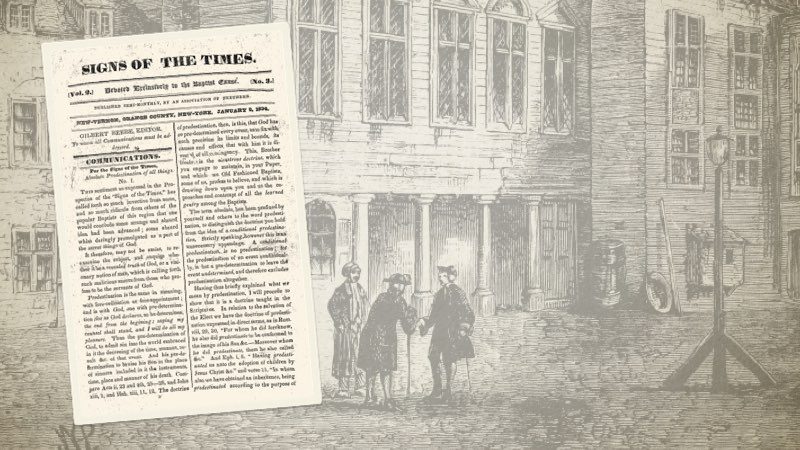
A Blow At Fullerism
The Signs Of the Times 1834:
Does the moral law require faith in the Mediator? Or, does the moral law require the faith of God’s elect? That the above law requires faith, I will not deny. I well know that there is a faith, which is one of the great and weighty matters of the law; but what faith is it? Is it that which stands inseparably connected with eternal life and salvation? If it is, then we are saved through the Law: but the Apostle says we are saved through faith; now if the faith through which we are saved is a duty of the Law (as it must be if the law requires it) we must be saved through the law, and a work of it. But the truth is we are saved through the Gospel, called the Gospel of our salvation, and law of faith, and not through the Law: for the promise that he should be the heir of the world, was not to Abraham, or to his seed, through the law, but through the righteousness of faith, Rom 6:13. The eternal inheritance, then, is not through the law and its duty, but through the Gospel and its promises, Gal 3:18. The faith under consideration is a blessing of the covenant of grace: this must be either admitted or denied. If you deny it you renounce the Gospel which says that “Faith is the gift of God. That he chose his people to the belief of the truth; that he gives them on the behalf of Christ to believe on his name; that when he calls them to believe, it is according to his own purpose and grace given them in Christ before the world began; and that his covenant is ordered in all things and sure;” and, therefore, must include Faith.
“While the two covenants are distinct, the things belonging to the one, must be kept separate from those pertaining to the other. The blessings of that of grace cannot with the least shadow of propriety be said to be the duties of that of works.”
Before the fall, the law was the rule of our innocent progenitor’s conduct. After his apostasy, it thundered forth the divine vengeance against him, and poured forth its tremendous curses upon the guilty head. It showed him no pity—gave him no quarters—revealed no savior to him—made no mention of away to escape—nor pointed him to the most distant shadow of a remedy. All it could do for him, or any of his ruined posterity, was to convince them of their sins, and drive them to despair and death, and leave them without the smallest degree of hope or help. Far, very far from directing them to believe in him who saves the guilty. It is the office of God the Father to give faith, not to demand it as a Law-giver, but to give it as a covenant God of grace. It is the office of the Gospel to reveal Christ, the object of faith; and it is the office of the Holy Ghost to work faith in the hearts of the Elect.
If faith is a duty of the covenant of works, are not believers under that covenant and its curse? I think they are; for if it requires faith in Christ of them, it obliges them, not only to begin, but to continue to believe. Now if they are thus bound by it, they are under it; for, if a man is bound by any covenant, human or divine, to perform an act either natural or spiritual, he is under that covenant. Thus, by making the faith of God’s elect an old covenant duty they put the legal yoke upon the necks of the Disciples of Jesus, bring the free children of Zion into bondage, and expose them to all the thunders of the ministration of death: “for, whatsoever the law saith it saith to those who are under it; and, as many are are of the works of the Law (of which they say faith is one) are under the curse.” This notion robs both Christ and his people. Christ, of the honor of making them free from the yoke of bondage; and them, of their right to that liberty wherewith he has made them free. How a man can be bound by a law to perform a duty, and at the same time be free from that law, I think they will find it a task too difficult for them to show.
If it is still maintained, that the law originally contained a command to believe in the Saviour, but did not reveal the command to Adam, because his circumstances were not suited to such a revelation—to this I reply, if the law originally contained a command to believe in the incarnate God and Saviour of sinners, it must also contain a revelation of the object to be believed in; for it is impossible to separate the one from the other. It would be a contradiction of both reason and truth to say, that a command to believe in an object can be without a revelation of that object: because the command itself is the revelation.
Now if both these were contained originally in the law, but, were concealed on account of Adam’s circumstances, we may reasonably suppose, that when his state was changed, and he was in a suitable condition, the secret would have been divulged, and what before was hid, proclaimed upon the house-top. But was this the case?—Did the law proclaim the Savior, and publish justification, pardon, and salvation, in his name? If it did, where was the need of the Gospel? Does the Gospel do more than this? And why did not the Apostle Paul preach the law instead of the gospel, for the obedience of faith, among all nations—either the gospel alone makes this revelation, and the law is silent on the subject or the law and the gospel are the same. If they are distinct things, and the gospel publishes salvation by Christ, and is preached for the obedience of faith, then the law never did contain a command to believe in Jesus to the saving of the soul.
Scraps
It may be argued the Strict and Particular Baptist churches of the 17th, 18th and early 19th centuries were at their strongest when they remained independent congregations, unaffiliated with Magazines and Societies. This strength was lost during the latter half of the 19th century when the churches clamored around favorite periodicals and regional associations. Although the Magazines were largely responsible for creating a party-spirit and culpable for stirring up needless controversy, they nevertheless contain many valuable resources which may prove a blessing for this generation. Although they differed on various points of doctrine, they invariably held to high views of sovereign grace, denouncing as heresy the pernicious teachings of Andrew Fuller. The majority of Strict and Particular Baptist churches during the 18th and 19th centuries were Hyper-Calvinists.



